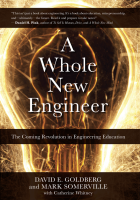Media Requests
For media requests, email press@bigbeacon.org or call 1-217-621-2645. Please include contact information, publication/news outlet/blog, topics you are covering, questions you have, and deadline.
Press Room News
Jazz & 21st Century Learning
March 14, 2015
David Goldberg shares how learning jazz guitar has shown him new ways to best empower students to…
Six Minds & the Petroleum Industry
March 14, 2015
The Journal of Petroleum Technology recently published a piece by David Goldberg on how the Six…
A Whole New Engineer (WNE) Quick Overview
- One book. WNE tells the unlikely story of an unlikely collaboration with a surprising conclusion (Introduction)–that culture and emotional change are the key variables for successful educational change, not content, curriculum, or pedagogy.
- Two schools. WNE tells the story of the founding of Olin College (chapter 1) and the iFoundry incubator at the University of Illinois (chapter 2), and the lessons about 21st education they learned together.
- Three missed revolutions. WNE gives an historical review (chapter 3) going back to the 19th century, and the 3 missed (missed in universities) revolutions since WW2, the entrepreneurial, quality, and information technology revolutions.
- Four technologies of trust. WNE surveys important theories and practices surrounding 4 technologies of trust: intrinsic motivation (chapter 6), executive and leadership coaching (chapter 7), organizational culture (chapter 8), and change management (chapter 9).
- Five pillars of transformation. WNE surveys (chapter 5) the cultural-emotional pillars of change: joy, trust, courage, openness, and connection.
- Six minds of the whole new engineer. WNE goes beyond the narrow technical framing of engineering education to invoke six minds (chapter 4): analytical, design, people, linguistic, body, and mindful minds.
- Collaborative disruption. WNE calls (Epilogue) for the formation of a social movement called Big Beacon to promote open innovation for engineering educational transformation, leading to collaborative disruption of the status quo.

